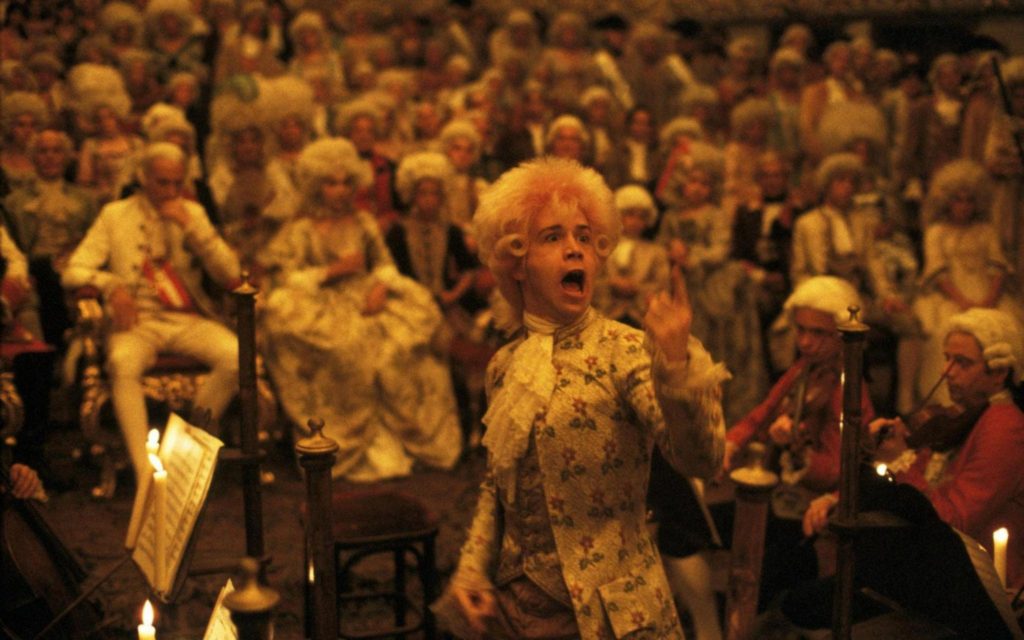
There is little, if any, historical accuracy in Amadeus. The portrayal of Mozart (Tom Hulce) as vulgar libertine is certainly based in much historical fact, but as seen through the eyes of Antonio Salieri (F. Murray Abraham), the film’s antihero protagonist and unreliable narrator, even the extent of the genius’ crassness can be called into question.
More importantly, Mozart’s genius—as portrayed by the film—can be called into question, since it is equally tainted by Salieri’s envy-saturated vision. The notion that Mozart wrote note perfect first drafts of his compositions is ludicrous and factually wrong. Naturally, it’s how Salieri remembers the composer he wished he could have been.
That merely summarizes the film’s inaccuracies in regards to the portrayal of Mozart, to say nothing of the fictious account of Salieri, consumed by a murderous envy toward a rival composer. Nonetheless, the historical fiction of Peter Shaffer’s play adaptation under the direction of Milos Forman creates not only a brilliant cautionary tale about the danger of envy and pride, but also a stunning testament about how God’s love manifests itself in the most unexpected ways.
One of the most important aspects of the film is its title, a word which the aged Salieri lingers over in his mockery of confession that frames the film. “I didn’t [write Eine kleine Nachtmusik],” he tells the priest pathetically trying to counsel him. “That was Mozart. Wolfgang…Amadeus…Mozart.” Abraham’s delivery of that one word summarizes the tragedy of the film more than anything else. Salieri cannot accept a loving God who bestows His gifts freely on humankind with all their imperfections and mediocrities.
In Salieri’s mind, love is something that is earned, which obviously means it is not love. In many ways, Salieri believes the same heresy as the prosperity gospel: if one is pious and prayerful enough, God will grant them a life of success and fame. In the case of Amadeus, that success and fame is music, which is why even in death Mozart’s genius continues to haunt Salieri.
As perfectly cast as Abraham is, the flippancy and crudity of Tom Hulce’s Mozart is an essential thorn in Salieri’s side. The earthiness of Mozart’s introduction as he plays a vulgar word game with his future wife Stanzi (Elizabeth Berridge), while unknowingly spied on by Salieri sets up the contrast between his personality and his music, which Salieri cannot reconcile.
However, Mozart’s real introduction comes in the first scene of the film when Salieri slashes his throat underscored by the opening of Mozart’s Symphony No. 25 in G Minor. The gravitas and darkness of the syncopated rhythms and minor arpeggios expresses Salieri’s despair and his lifelong obsession, once again making him subservient to his self-created rival. In that choice of underscoring, the film itself comments on the tragic and pathetic nature of Salieri’s decision to take revenge against God for making Mozart more talented than he was.
Obviously, there is no need to reconcile the profundity of Mozart’s music and the coarseness of his conduct except in Salieri’s poisoned worldview that God only loves the deserving, and that love only manifests itself through worldly success. Thus, Salieri’s envy gave way to pride. Since God obviously loved Mozart, as can be seen through his impeccable talent, Salieri decided to destroy God’s beloved as revenge against God. It’s a tragedy of Greek proportions, and the horror of watching it is seeing a man knowingly accept his own damnation.
The priest is rendered speechless by Salieri’s unrepentant admission of his hatred for Mozart and God, but the film is a perfect inversion of St. John’s admission, “He who does not love his brother whom he has seen cannot love God whom he has not seen.” (1 John 4:20)
That Salieri’s attempted revenge concludes with his plot to steal Mozart’s Requiem and pass it off as his own is yet another perversion of something sacred, in addition to his rejection of repentance or absolution. That arrogance is carried through to the famous final lines of the film. Unable to realize that success and talent are not metrics of God’s love, Salieri sets himself up as the arbitrator of forgiveness and absolution, proclaiming his own judgments of everyone’s abilities.
In my mind, Amadeus is one of the most terrible tragedies ever filmed. And also one of the most perfect ones. The ability to recognize God’s goodness and love in music is a great gift. Salieri’s choice to let it inspire uncontrollable envy makes his corruption of that gift all the greater. The contrast between that corruption and the beauty of Mozart’s music highlights Salieri’s pathetic revenge, which doesn’t destroy Mozart or God, but only makes him more of a mediocrity that he so despises.
— Evan Cogswell (2020)
- Directed by: Milos Forman
- Produced by:
- Written by: Peter Shaffer
- Music by:
- Cinematography by: Miroslav Ondrícek
- Editing by:
- Release Date: 1984
- Running Time: 160
- Language: English
Arts & Faith Lists:
2004 Top 100 — Unranked List
2005 Top 100 — #97
2011 Top 100 — #95
2020 Top 100 — #76